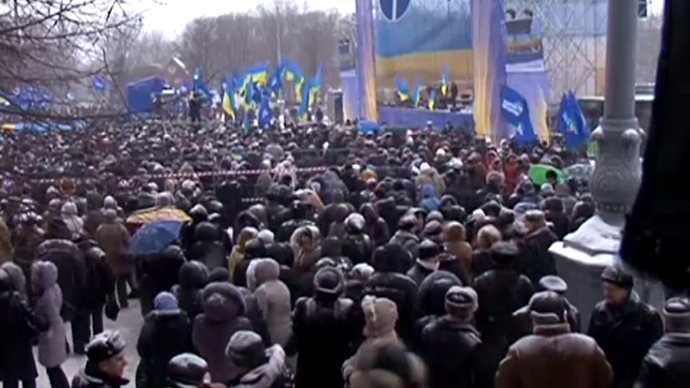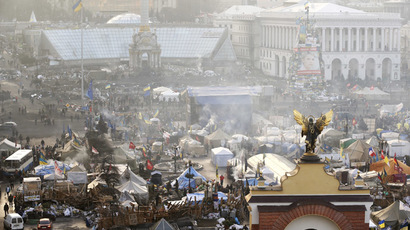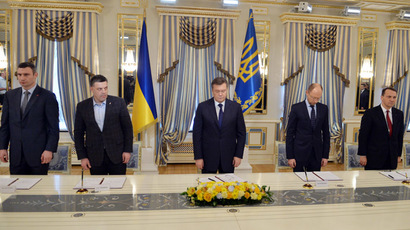Ukraine's Southeast seeks to restore constitutional order, thousands gather in Kharkov
The public gathering of deputies from local councils of southeastern Ukraine have declared they are taking responsibility for constitutional order in the country, as thousands of people have assembled in the city of Kharkov.
Follow RT's LIVE UPDATES
An assembly of local deputies in Kharkov, eastern Ukraine have
stated their intention to restore “constitutional order”
throughout the country, aiming to create an alternative
government.
“We, the local authorities of all levels, the Supreme Council
of the Autonomous Republic of Crimea, Sevastopol region decided
to take responsibility for ensuring the constitutional order and
the rights of citizens on their territory,” said the
resolution approved by more than 3,000 deputies from local
councils in the southern and eastern regions of the country –
most of whom represent Yanukovich's Party of Regions and its
communist coalition partners.
According to the resolution, local authorities should no longer
accept any edicts from Kiev for the time being. Instead, they
should resort to self-administration until the crisis is
resolved.
Officials also intend to protect arms depots, preventing radical
opposition activists from looting and staging the takeover of
such venues. Citizens are encouraged to form local militias to
protect public order. Local authorities are to fund and support
those militias.

The deputies criticized the resolutions that have been speedily
passed in parliament over the past few days, which culminated in
the stripping of Viktor Yanukovich's powers and the release of
former Prime Minister Yulia Tymoshenko.
According to the resolution, the new edicts – backed by an
opposition minority and several dozen defectors from Yanukovich’s
coalition – were approved under conditions of “terror, threats of
violence and death.”
More than 10,000 Yanukovich loyalists assembled at the Sports
Palace of Ukraine’s second-largest city.
“3, 477 deputies from local councils in southeastern Ukraine
have gathered. We have gathered here not to separate the country,
but to save it,” regional Governor Mikhail Dobkin told the
crowd.
The head of the Kharkov administration, Gennady Kernes, has
called the public gathering “an attempt by qualified deputies
from the east of the country to stabilize the situation.”
"My colleagues and I have been personally threatened. But
today we have gathered to change the situation,” he said.
Russia sent several officials in the capacity of observers to the
gathering, including the head of the Russian parliamentary
commission on foreign affairs, Aleksey Pushkov, as well as
Pushkov's counterpart in the Russian Federation Council, Mikhail
Markelov. The upper chamber of parliament and several governors
from eastern Russian regions were also in attendance.

“The decisions taken here are positive and concrete. What is
important is that everything voiced here was implemented in the
interests of the Ukrainian people and the entire Ukraine. What
Ukraine needs now is common sense and a survival instinct,”
Evgeny Savchenko, governor of Russia’s Belgorod region, which
borders Ukraine, said.
The creation of an alternative power base – if the new
resolutions become the government's foundation – is a logical
next step in a Ukraine that remains deeply divided.
The eastern and southern parts of the country, where about half
of Ukraine's 45 million citizens live, uses Russian – not
Ukrainian – as its everyday language, is more wary of ties with
Europe, and votes for more left-wing parties than the west of the
country. It is also the industrial base of the country, with
legacy mining and metals industries left from Soviet times. All
of the country’s sea ports are also in the region.
Kiev is now fully under the opposition’s political control. The
quorum in the Rada has circumvented usual constitutional
procedures to appoint a new cabinet and amend the constitution.
It has removed Viktor Yanukovich from his post for failing to
perform his duties after he left Kiev, though the politician says
he is still president and has no plans to resign. The Rada has
also scheduled a presidential election for May 25.














